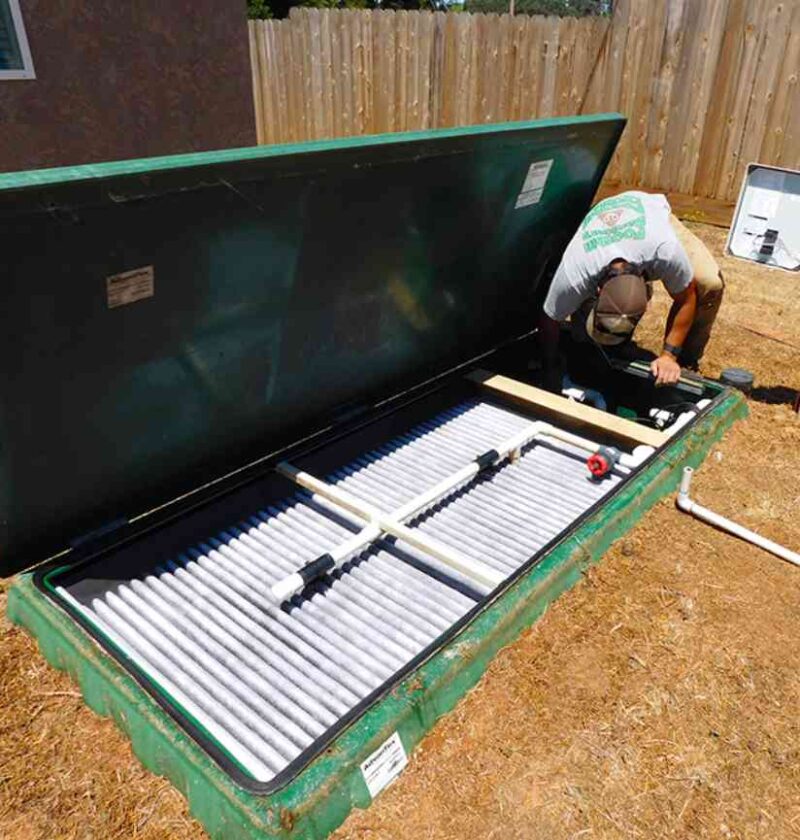Understanding a septic system’s basic operations can significantly help its maintenance. Septic systems treat wastewater from homes and businesses not connected to centralized sewer systems. The system carries wastewater from toilets, baths, showers, sinks, and appliances to an underground septic tank.
The primary function of the septic tank is to segregate solids from liquids. Solid particles collect at the base as sludge, while oils and fats rise to the surface as scum. The remaining effluent liquid exits the tank and is sent to the drain field. In the drain field, the wastewater is naturally filtered by the soil and treated before it reaches the groundwater.
Signs Your Septic System Needs Service
Recognizing early warning signs that indicate your septic system may need service is crucial. Common indicators include slow drainage in sinks, tubs, and showers, gurgling sounds in plumbing, unpleasant odors around your property, and water pooling in the yard near the septic tank or drain field.
Disregarding these indicators may result in major problems, such as backups, system failures, and costly repairs. Regular inspections and routine maintenance, such as those offered by foothills septic pumping, can help identify and resolve these issues before they escalate into more severe problems.
Routine Maintenance Tips
To avoid costly repairs, there are several routine maintenance tips every homeowner should follow:
- Have your septic system inspected by a professional every three years. Inspections help identify potential problems early before they require significant repairs.
- Pump the septic tank every three to five years, depending on household size and usage. Consistent pumping aids in eliminating built-up sludge and scum, guaranteeing optimal system performance.
- Use water efficiently to prevent overloading the system. Fix any leaky faucets or running toilets, and consider installing high-efficiency toilets and showerheads.
- Divert rainwater and surface water runoff away from the drain field. Excess water can saturate the drain field, limiting its ability to treat wastewater.
- Avoid using garbage disposals excessively. Ground-up food waste can add a solid load to the septic tank, affecting efficiency and accelerating the need for pumping.
Dos and Don’ts for Septic Systems
Adhering to some simple dos and don’ts can significantly prolong the life and efficiency of your septic system:
- Do: Use septic-safe toilet paper and cleaning products. These items deteriorate rapidly and do not disrupt the bacteria equilibrium in your septic system.
- Don’t: Flush non-biodegradable items like wipes, sanitary products, or dental floss. These can cause blockages and damage your septic system.
- Do: Keep trees and shrubs away from the drain field. Roots can infiltrate and damage pipes, leading to blockages and system failures.
- Avoid dumping fats, oils, or grease in the sink because they may harden and block drains.
- Do: Spread out laundry and dishwasher loads throughout the week to avoid overloading the system in a single day.
- Avoid using chemical additives in your septic system. These chemicals have the ability to eradicate the helpful bacteria essential for decomposing waste.
Common Problems and Solutions
Some common problems with septic systems include clogs, leaks, and system failures. Obstructions may arise in the pipes that go to the septic tank or within the tank, resulting in gradual drainage and blockages.
Leaks might happen due to cracks in the tank or pipe damage, leading to wastewater seeping into the ground and contaminating the surrounding environment. Regular inspections and adhering to maintenance guidelines can mitigate these issues.
For example, clogs can often be prevented by not flushing non-biodegradable items and limiting garbage disposal usage. If leaks or other significant problems are detected, it’s essential to consult a professional immediately. Regular pumping and inspections can prevent expensive repairs and prolong the life of your system.
Professional Septic Services
Hiring professional services like Foothill Portables is essential for complex issues and routine maintenance. Professionals have the necessary tools and expertise to ensure your system operates optimally. They can inspect thoroughly, identify potential problems, and provide solutions that a DIY approach might need to be revised.
Professionals can also recommend the appropriate frequency for pumping based on your specific usage and system type. Additionally, they can offer advice on other preventative measures, such as proper water usage and landscaping choices to protect the drain field.
Benefits of Regular Septic Maintenance
Regular septic maintenance offers numerous benefits, including extending the system’s lifespan, preventing environmental contamination, and avoiding expensive emergency repairs. It also helps maintain a safe and clean environment for your household and the surrounding areas.
Consistent maintenance ensures that all septic system components function correctly and reduces the risk of unexpected failures. Proper care can also help retain the property value and eliminate potential health hazards caused by sewage backups and leakage.







